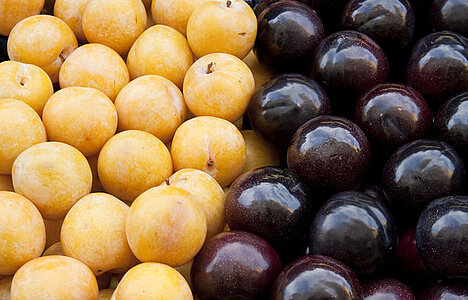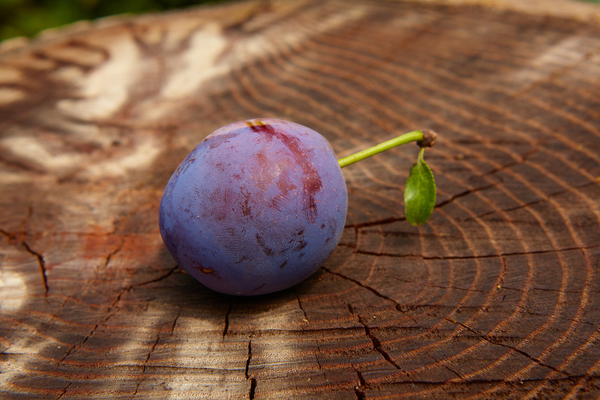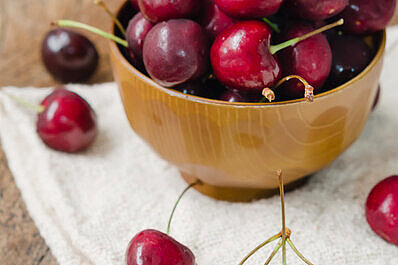Precious plum

Do you love plums and want to share them with your dog? Or have you heard of prunes and are wondering what they are all about and whether they are good for your four-legged friend? In this article, you'll find out all about this special type of fruit and its effect on dogs.
What is a noble plum?
The noble plum is a subspecies of the plum (Prunus domestica), which is characterized by its elongated shape and dark blue color. It is also known as the damson plum and originally comes from the Mediterranean region. The plum has a sweet and sour taste and firm flesh that is ideal for baking and preserving.
What are the benefits of plums for dogs?
Plums are generally healthy for dogs as they contain many vitamins, minerals and trace elements. These include, among other things
- Vitamin A: promotes eyesight, the immune system and skin health
- B vitamins: Support metabolism, nerve function and blood formation
- Vitamin C: strengthens the immune system, has an antioxidant effect and promotes wound healing
- Vitamin E: protects against free radicals, promotes blood circulation and muscle function
- Potassium: regulates water balance, blood pressure and heart function
- Calcium: strengthens bones, teeth and muscles
- Magnesium: relaxes the muscles, promotes nerve function and energy metabolism
- Iron: Oxygen transport in the blood, promotes the formation of red blood cells
These nutrients have a positive effect on your dog's health. Plums also have a high fiber content, which is good for digestion. They can help with constipation or diarrhea by regulating bowel movements.
What are the disadvantages of prunes for dogs?
Prunes are healthy for dogs, but only in moderation. Too many prunes can lead to gastrointestinal complaints such as flatulence or abdominal pain. Plums also contain a lot of sugar, which can lead to tooth decay or obesity.
Another disadvantage of plums are their seeds. These contain amygdalin, a substance that is broken down in the body into hydrocyanic acid. In high doses, this can lead to symptoms of poisoning such as breathing difficulties or convulsions. You should therefore never give your dog plum kernels or let him nibble on a plum tree.
How do you feed your dog prunes?
If you want to give your dog a prune from time to time, there are a few things you should bear in mind:
- Wash the prune thoroughly and remove the stone. The stone contains amygdalin, a toxic substance that breaks down into hydrocyanic acid in your dog's body. The stone can also cause a life-threatening intestinal blockage.
- Peel the plum or sauté it lightly. The skin is difficult for your dog to digest and can ferment in the intestines.
- Puree the flesh or cut it into small pieces. This makes it easier to dose and easier for your dog to swallow.
- Only give your dog a small amount of prune as a treat or with food. Half to a whole prune per day is enough for a medium-sized dog. Too much can lead to diarrhea, flatulence or obesity.
- Avoid dried or fermented prunes. They contain even more sugar and can lead to alcohol poisoning.
Prunes are a tasty and healthy ingredient for dogs if they are prepared correctly and fed in moderation. They can promote your dog's health and provide variety. However, make sure that you do not feed any pits or skins and only use ripe plums.
If you notice any signs of hypersensitivity or poisoning in your dog, you should see your vet immediately. We are not a substitute for a vet, but we try to be as accurate as possible. Every dog reacts differently and we recommend you get a second opinion or consult your vet if in doubt.
Stay healthy and take good care of your four-legged friend!😊
Similar to Precious plum
A mirabelle is a small, yellow or red plum that originally comes from Asia. It has a sweet and juicy taste and is rich in vitamins, minerals and fiber. Mirabelle plums are usually eaten fresh or...
Plums can provide some health benefits to dogs when fed in moderation. For example, they can: Aid digestion as they are high in pectin, which stimulates intestinal transit.Strengthen the immune...
A cherry is a stone fruit that belongs to the rose family. There are many different varieties of cherries, which differ in color, size, taste and sweetness. The best known are sweet cherries and...
Apricots are stone fruits that belong to the rose family. They have a yellow-orange color and a sweet aroma. The fruit grows on trees and is usually harvested in summer. Apricots can be eaten fresh...



